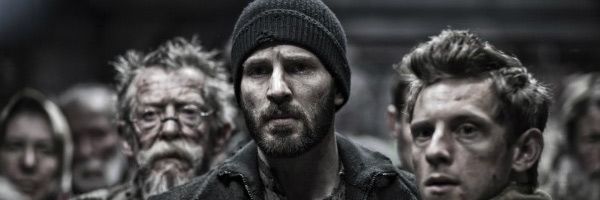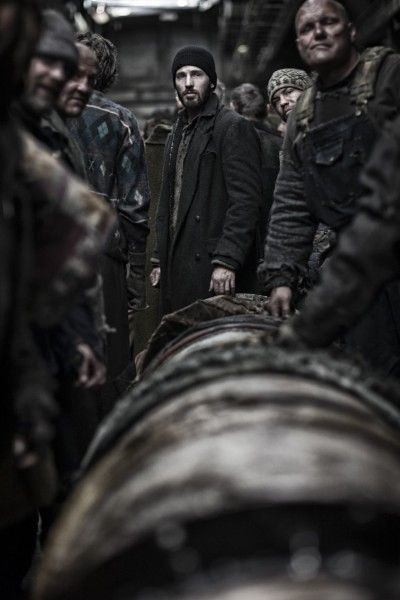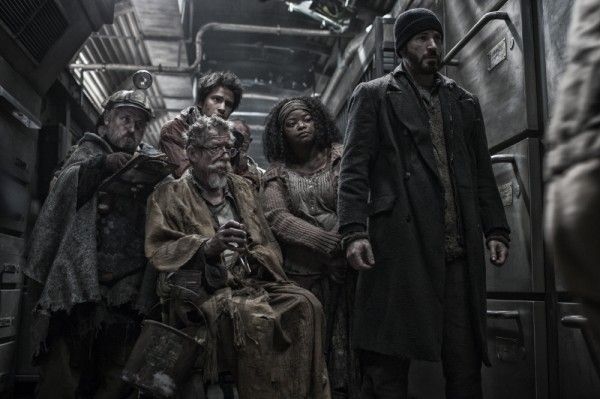Even in a year full of excellent science-fiction fare, Joon-ho Bong’s Snowpiercer stands out. The film tells the story of a post-apocalyptic world where all life on Earth is contained to a single luxury train that circles the frozen planet once yearly. Within the train, a tightly controlled caste system has developed. When members of the train’s underclass attempt a rebellion, all hell breaks loose and long held secrets of this world come to light. The movie stars Chris Evans, Tilda Swinton, The Host’s Kang-ho Song and Ah-sung Ko, Ed Harris, John Hurt,, Jamie Belle, Octavia Spencer and Alison Pill is available in theaters and most every VOD marketplace now. But it really, really should be seen on the big screen.Last weekend at Comic-Con, Collider sat down with Evans and Co-Producer Dooho Choi for an intimate press conference to discuss the film. During the small group chat, Evans and Choi described Bong’s artistic vision, the elaborate fight scenes, avoiding the Harvey Scissorhands treatment, why a film with so many stars and such good reviews hit VOD two weeks after theatrical, the magic of Tilda Swinton, crooked-necked giraffes, watching a cut of the first two acts before the final day of principal photography and more. Hit the jump for the full transcript.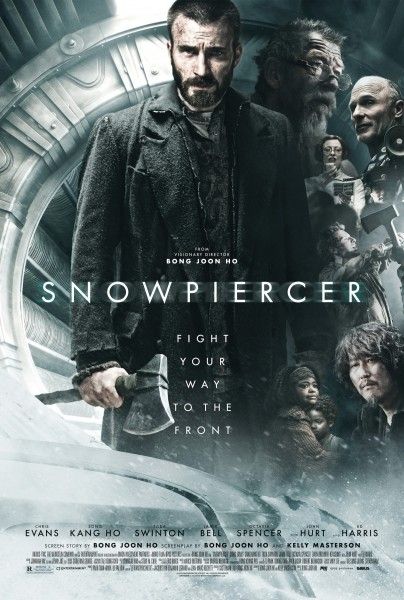 Below the interview I have included links to a selection of interesting essays on the previous work of Joon-ho Bong as well as google books links to several of the textbooks assigned for a class on modern Korean cinema that I took during my undergrad years. If you’re a fan of Oldboy and The Host, I assure you, the well goes much deeper.QUESTION: I had a very passionate discussion about this movie with several friends last night. We were trying to figure out how much of the story was supposed to feel like a fable. Was the concept of fables ever discussed during production?CHRIS EVANS: What is every discussed as a fable? I wouldn’t have done the movie if I didn’t have confidence in [Joon-ho] Bong finding deeper layers than just, some sort of interpretation of a graphic novel. That’s what Bong is phenomenal at, in all of his movies, there is always a lot more than meets the eye. So you try to trust that Bong has a lot more intention that just what’s on the surface. But in terms of it being a fable…?DOOHO CHOI: There’s definitely a lot of allegory in it, metaphors for different things. But I think that the conversations that Director Bong had with Chris [Evans] were more just about the character and his journey and how to make it real.How did you research the role? Did you look into what happens to people forced into such close quarters?EVANS: Sure. I tried to spend some times on the sets. The sets were so beautiful. The best thing about this movie was that we had a tangible world to play off of. So the first day I went down and saw where we were going to be filming, and it was so beautiful. And I tried to say to everyone, ‘Is there some way I can carve out some time just to come here and stay here for a while, just to be by myself for a few hours?’ So there were a few days when I spent a couple of hours just coming down to a few cars and hanging out by myself and just kind of getting a sense of imagining what it would be like for— I mean, it’s impossible to fully grasp fully what it’s like to be there for 17 years, but you do try to spend as much time as you can getting comfortable with the environment and trying to figure out that sensation would be.Which part of the train was your favorite?EVANS: I’d say the tail section. I mean, for me, the tail section is, I think that’s [my character] Curtis. I think that’s who he is. The tail section is hard; it’s grinding; it’s tough; it’s real. So that’s where I had the most fun. Back there. We see maybe 20, 30 cars in the film. But in the exteriors, it seems like it could be 1000. Were there any other train cars we didn’t see, explaining where the steaks came from, maybe?CHOI: Actually, it’s a 60 car train and we see 26 cars. That’s how many we actually built. So yeah, there are definitely a lot of cars that we don’t see in the film.Can you tell us what some of those cars may he been? Was it outlined?CHOI: No, we just shot what was in the script. So whatever fulfilled the needs of a particular section is what we shot. They asked Bong a bunch of times, like, if there were any cars that he imagined that he didn’t shoot and one of them was a zoo section with animals crammed in and a giraffe, like, with his head down to fit inside. But that was ultimately abandoned because he wanted to show life at the end. So he didn’t want to show living animals inside.Do you have any thoughts on the VOD release and how it came out on VOD so soon after theaters.EVANS: You know, I’m just learning about this. I mean, the movie has done phenomenally well, but it’s all new to me. Being an actor for X-amount of years, I certainly don’t concern myself with how things are released or where they are released. This is all brand new to me. I just directed a movie last year and even in the process, there are still so many elements of post-production and how a film is handled that I am still learning. You know, it seems like this is a pretty pioneering film in how VOD has been accepted in the market. So it’s all new to me and it sounds like this is doing pretty well in the capacity that it’s being released. But you know, you kind of discover how green you really are and I’m learning with everybody else. So I couldn’t really give my opinion, it wouldn’t be worth it.Do you have a preference of how you would prefer people to watch the film?EVANS: I absolutely think it should be seen on a big screen. But I read something where someone from RADiUS that said, ‘A screen is a screen is a screen.’ and, you know There’s a couple of different ways to interpret that. Personally I think a movie— I like going to movies. I like buying my ticket and sitting in a theater. And I guess that’s still available. It would be a shame if we suddenly lost that opportunity, so I hope it doesn’t tip the scales too far in one way. But by the same token, I’ve had a lot of people contact me and say they’ve seen the movie, not in a theater but still had positive things to say. So it’s a grey area in terms of, you know, what’s the best way to do this? What’s it worth?One of my favorite scenes was that night vision scene, that battle. It looked incredibly complex to make. Can you talk a bit about how you made that?
Below the interview I have included links to a selection of interesting essays on the previous work of Joon-ho Bong as well as google books links to several of the textbooks assigned for a class on modern Korean cinema that I took during my undergrad years. If you’re a fan of Oldboy and The Host, I assure you, the well goes much deeper.QUESTION: I had a very passionate discussion about this movie with several friends last night. We were trying to figure out how much of the story was supposed to feel like a fable. Was the concept of fables ever discussed during production?CHRIS EVANS: What is every discussed as a fable? I wouldn’t have done the movie if I didn’t have confidence in [Joon-ho] Bong finding deeper layers than just, some sort of interpretation of a graphic novel. That’s what Bong is phenomenal at, in all of his movies, there is always a lot more than meets the eye. So you try to trust that Bong has a lot more intention that just what’s on the surface. But in terms of it being a fable…?DOOHO CHOI: There’s definitely a lot of allegory in it, metaphors for different things. But I think that the conversations that Director Bong had with Chris [Evans] were more just about the character and his journey and how to make it real.How did you research the role? Did you look into what happens to people forced into such close quarters?EVANS: Sure. I tried to spend some times on the sets. The sets were so beautiful. The best thing about this movie was that we had a tangible world to play off of. So the first day I went down and saw where we were going to be filming, and it was so beautiful. And I tried to say to everyone, ‘Is there some way I can carve out some time just to come here and stay here for a while, just to be by myself for a few hours?’ So there were a few days when I spent a couple of hours just coming down to a few cars and hanging out by myself and just kind of getting a sense of imagining what it would be like for— I mean, it’s impossible to fully grasp fully what it’s like to be there for 17 years, but you do try to spend as much time as you can getting comfortable with the environment and trying to figure out that sensation would be.Which part of the train was your favorite?EVANS: I’d say the tail section. I mean, for me, the tail section is, I think that’s [my character] Curtis. I think that’s who he is. The tail section is hard; it’s grinding; it’s tough; it’s real. So that’s where I had the most fun. Back there. We see maybe 20, 30 cars in the film. But in the exteriors, it seems like it could be 1000. Were there any other train cars we didn’t see, explaining where the steaks came from, maybe?CHOI: Actually, it’s a 60 car train and we see 26 cars. That’s how many we actually built. So yeah, there are definitely a lot of cars that we don’t see in the film.Can you tell us what some of those cars may he been? Was it outlined?CHOI: No, we just shot what was in the script. So whatever fulfilled the needs of a particular section is what we shot. They asked Bong a bunch of times, like, if there were any cars that he imagined that he didn’t shoot and one of them was a zoo section with animals crammed in and a giraffe, like, with his head down to fit inside. But that was ultimately abandoned because he wanted to show life at the end. So he didn’t want to show living animals inside.Do you have any thoughts on the VOD release and how it came out on VOD so soon after theaters.EVANS: You know, I’m just learning about this. I mean, the movie has done phenomenally well, but it’s all new to me. Being an actor for X-amount of years, I certainly don’t concern myself with how things are released or where they are released. This is all brand new to me. I just directed a movie last year and even in the process, there are still so many elements of post-production and how a film is handled that I am still learning. You know, it seems like this is a pretty pioneering film in how VOD has been accepted in the market. So it’s all new to me and it sounds like this is doing pretty well in the capacity that it’s being released. But you know, you kind of discover how green you really are and I’m learning with everybody else. So I couldn’t really give my opinion, it wouldn’t be worth it.Do you have a preference of how you would prefer people to watch the film?EVANS: I absolutely think it should be seen on a big screen. But I read something where someone from RADiUS that said, ‘A screen is a screen is a screen.’ and, you know There’s a couple of different ways to interpret that. Personally I think a movie— I like going to movies. I like buying my ticket and sitting in a theater. And I guess that’s still available. It would be a shame if we suddenly lost that opportunity, so I hope it doesn’t tip the scales too far in one way. But by the same token, I’ve had a lot of people contact me and say they’ve seen the movie, not in a theater but still had positive things to say. So it’s a grey area in terms of, you know, what’s the best way to do this? What’s it worth?One of my favorite scenes was that night vision scene, that battle. It looked incredibly complex to make. Can you talk a bit about how you made that?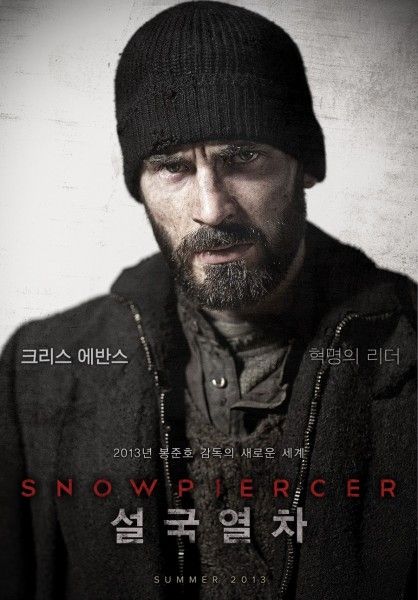 EVANS: Sure. It was hairy. It was very dirty. It’s one of those scene where we had some great stunt men, some great stunt coordinators. It was a really messy scene. But a lot of it was far more choreographed than you would expect. Each moment was created. But it’s a sloppy fight, it’s supposed to look messy and no one there is a trained fighter, so it should look a little unorganized. And I think we did a good job of accomplishing that. But it actually is kind of like a dance.In that fight scene, you slip on a fish. It’s my favorite moment in the entire movie. But it’s so almost out of place in an American-style movie. Was there ever any discussion about that making sense? Was it one of the things that the Weinstein’s were uncomfortable with during the editing process?EVANS: There may not have been a discussion, but I was thinking it! I mean, that’s the thing about this whole movie, there’s so many parts of this movie where you’re just like,’What? What! What is going on!?’ When they bring the fish out and cut it, it’s like, ‘What are they doing?’ But it’s what makes this movie so cool, it’s what makes this movie so unique an special and artistic and powerful, because it really is so out of left field and so unique and so Bong, in a way. There are a lot of moments where you kind of question, ‘Is this going to…’ Even in sections of the script itself, you read it and you kind of question whether certain things will make sense. But there is a trust you just have to have with certain filmmakers and storytellers who you just know have an artistic eye and just know what will make sense to a willing audience. So a lot of times you just hand over your trust to the director. What were some of those moments when you read the script?EVANS: All of them! One of the big things - I read a couple of reviews - one of the big things I had was, in the beginning of the movie, I wanted more explanation. You know, how did this happen? I just wanted more info. What was the experience? Where was this train when the froze? Was the train in one spot? Did everyone clamor on at once? I just wanted, my rational mind wanted more clarity. But bringing these things up to Bong, he seemed kind of like, ‘That’s not necessary.’ He saw a bigger picture, something broader, something more beautiful and artistic than my mind could grasp on paper. And ultimately it did make sense. And I’ve read just the most phenomenal reviews from people who just went on the ride. It’s like those— Blade Runner. One of those movies where you just accept certain things. But when you’re reading words on a page, your mind desperately wants to make sense of things and it’s hard to kind of realize that you’re going to have this kind of artistic vision quarterbacking these scenes. So initially, there were a lot of scenes where I was like, ‘Who’s sending these things and how does he send these red letters?’ There were a lot of questions I had, but if the movie is done right, you go for the ride.
EVANS: Sure. It was hairy. It was very dirty. It’s one of those scene where we had some great stunt men, some great stunt coordinators. It was a really messy scene. But a lot of it was far more choreographed than you would expect. Each moment was created. But it’s a sloppy fight, it’s supposed to look messy and no one there is a trained fighter, so it should look a little unorganized. And I think we did a good job of accomplishing that. But it actually is kind of like a dance.In that fight scene, you slip on a fish. It’s my favorite moment in the entire movie. But it’s so almost out of place in an American-style movie. Was there ever any discussion about that making sense? Was it one of the things that the Weinstein’s were uncomfortable with during the editing process?EVANS: There may not have been a discussion, but I was thinking it! I mean, that’s the thing about this whole movie, there’s so many parts of this movie where you’re just like,’What? What! What is going on!?’ When they bring the fish out and cut it, it’s like, ‘What are they doing?’ But it’s what makes this movie so cool, it’s what makes this movie so unique an special and artistic and powerful, because it really is so out of left field and so unique and so Bong, in a way. There are a lot of moments where you kind of question, ‘Is this going to…’ Even in sections of the script itself, you read it and you kind of question whether certain things will make sense. But there is a trust you just have to have with certain filmmakers and storytellers who you just know have an artistic eye and just know what will make sense to a willing audience. So a lot of times you just hand over your trust to the director. What were some of those moments when you read the script?EVANS: All of them! One of the big things - I read a couple of reviews - one of the big things I had was, in the beginning of the movie, I wanted more explanation. You know, how did this happen? I just wanted more info. What was the experience? Where was this train when the froze? Was the train in one spot? Did everyone clamor on at once? I just wanted, my rational mind wanted more clarity. But bringing these things up to Bong, he seemed kind of like, ‘That’s not necessary.’ He saw a bigger picture, something broader, something more beautiful and artistic than my mind could grasp on paper. And ultimately it did make sense. And I’ve read just the most phenomenal reviews from people who just went on the ride. It’s like those— Blade Runner. One of those movies where you just accept certain things. But when you’re reading words on a page, your mind desperately wants to make sense of things and it’s hard to kind of realize that you’re going to have this kind of artistic vision quarterbacking these scenes. So initially, there were a lot of scenes where I was like, ‘Who’s sending these things and how does he send these red letters?’ There were a lot of questions I had, but if the movie is done right, you go for the ride.
Click to Page 2 for the rest of the interview
In terms of the fan campaign to get the film a wide release, were you all surprised by the outpouring of passion and support?
EVANS: I’ve been surprised about everything about this movie. I mean, every movie you make, you hope people will enjoy it. But this movie has kind of surpassed all of my expectations across the board. Every single day I have people emailing me and texting me and just saying the most wonderful things about this. But in terms of the way it was released, like I’ve said; I’m a little green. But it has been a constant surprise and a constant satisfaction, in terms of the way people are receiving it. Whether it be in a theater or whether it’s on VOD, it has been phenomenal. But, like I said, I’m still learning. So I don’t really know if I have an opinion, in terms of how it could have or should have been released.
Other than learning details of the modern multi-platform distribution game, are there any other lessons you learned from this film that you have taken into your career as a director?
EVANS: I mean, Bong does things very differently as a director. I don’t know if he, it’s amazing, it’s unbelievable. This is one of the things that I would see on set that would blow my mind. Typically, when you’re shooting a scene, you shoot— if we were having a scene, you would shoot in a master; you would get us together in a two shot; you’d do the whole scene; you’d get my single and your single and we would have a lot of options in the editing room to cut the scene together as you so choose. Bong will shoot the edit in his mind. So, you have storyboards and if I saw the scene between you and I, if the first three lines he saw in a two shot and the next two lines were on you and the next two lines were on me; that’s what he shoots. So we’d literally, ‘Shoot! Cut!’ [Snaps]. There were days when, there is plenty of dialogue that I had in the movie that are not on film. There is no footage of me saying certain dialogue. He shoots the movie according to what he sees in his brain. It’s the most bold, terrifying thing I’ve ever seen any director do. But it obviously worked out. I would never be that confident. But it worked out. It’s one of those amazing things that you can do when you’re that powerful of a filmmaker.
Can you talk about working with Tilda Swinton and what she brings out of you as an actor?
EVANS: Sure. We are lucky to be witnessing her as an actress, we are all better people for witnessing her performances. The best thing about Tilda is - I’ve worked with some actors - the best thing to do as an actor is to work with the director and to be willing to collaborate, you know? It’s a collaboration. Tilda is a good enough actress to be confident enough in her ability so that if Bong gives her any note any note, she’s like, ‘Sure. Let’s try it.’ She’s up for anything because she know it’s going to be phenomenal. So there is a beautiful collaboration, so there is a wonderful, bold willingness. So you find yourself as an actor watching, not listening anymore, just spectating and— ‘Oh shit I have a line?’ She’s so good, it’s just easy to get lost in what she does. It’s just so real and so present.
Did you guys shoot anything that didn’t make it to the finished film?
EVANS: Did we? I don’t think so. Bong doesn’t do that. When he shoots, he knows. That’s how it happens.
CHOI: He has an on set editor who is on the set, cutting as we’re shooting. So at the end of the day we watch the scene—
EVANS: You watch the scene! You film a scene, and at the end of the day, you watch the scene! That’s unbelievable! That doesn’t happen in movies! That doesn’t happen. It’s unbelievable. I’ve never been part of a movie that…
CHOI: Yeah, Ed [Harris] came in the last week of production. They day before, we all sat downy together and showed him what we’d been doing.
EVANS:Â Yeah, we showed him a movie!
CHOI: The next day is the next scene. Let’s do it. This is what we’ve shot so far.
EVANS: It’s amazing.
On set did you feel a divide between those who were in the front and those who were in the tail? Did Director Bong encourage you to stay apart?
EVANS: No, no. Not really. I’ll actually say, on this movie there was a real deep sense of unity, regardless of whether you were in the front or the tail. I mean, it’s such a unique film, again. It was a different way of shooting, a different script. You’re filming in a foreign location where nobody really knows each other. So the sense of camaraderie was very strong on this movie. So no, I never felt the need to avoid the front sectioners.
So, reason the movie had this multi platform release is---and Indiewire did a pretty extensive article that showed the movie will likely make about as much profit as it ever could have---was that, the Weinsteins wanted a different cut. They probably wanted it to be under two hours and to lose some of the subtitled portions of it, but can you go into any detail as to what changes they wanted to make and what portions that might have wanted to lose from the film?
CHOI: I think they just wanted to make a shorter film and to make it, more of a commercial type of film. And I think at one point, they just kind of realized, what makes this film unique is all of the things that Bong is great at. And so finally we decided, all of us, that it was best to just keep the film intact.
Was there ever another cut actually made with a voice over, or a…?
CHOI: No. There was some tests that we have done. There was one version that tested that was 20 minutes shorter. Director Bong has talked about that. And it didn’t test as well as [Bong’s] version.
Is there any truth to the reports that the Weinsteins were especially uncomfortable with the scene that involved a shooting inside the school train?
CHOI: I think there was some concern initially because the shooting in Connecticut had happened a short time ago. But by the time we released the movie, it wasn’t really an issue because, I think the people who saw the film realized that this was not a contemporary setting. It was in its’ own unique world and future. So it went away and wasn’t an issue.
You talked a little bit before about the background for the story for you, when you were getting on board. Can you talk a little bit about why that is important for you as an actor and getting into character and how that may have changed since you became a director?
EVANS: Sure. I mean, you always try and take as much time as you can and work on your collaboration with the director is enormously important. But every actor is different and as a direction, you kind of realize— even as an actor I realized that ever actor approaches things differently. And as a director, you have to - it’s not just organizing things, it’s not just setting shots, it’s not just communicating with every department - it’s about being able to know your actor and know what they need and what they want. Some actors, to get them where you need them to go, you may need to pull them aside and have a 20 minute discussion about whether their mom hugged them enough. And other actors, you just need to get out of their way. It’s an art unto itself, how to engage the actor and get what you need.
I couldn’t have asked for a better experience with Bong. Bong gave me everything I could have wanted and needed. Especially on the more emotional days, he is just among the better directors I have ever worked with, in terms of acting and helping me get what I need. Even with, when there were days when I would struggle. He had, even with the slight language barrier. He knew how to kind of pick very unique words. I feel like it’s such an awful thing to say. He could give you such a simple note and you would be like, ‘I got it. I got it. I know exactly what you want.’ And that’s a trait unique unto him. But in terms of directing myself or other actors, you have to approach every actor with kid gloves because you never know what they’re going to need or how they’re going to approach their own craft.
Does the film have a hopeful view of humanity, or a bleak view of humanity? What do you think?
EVANS: It’s a good question, I get asked that a lot actually.
CHOI: I think it’s a bleak journey to a happy ending.
EVANS: I’d say that as well. Thanks.
Your big emotional speech at the end is so good, but when you read that and you know how you have to do that, is that as an actor, is that terrifying or exciting?
EVANS: It’s terrifying. It’s terrifying because - again, movies are a collaboration - so you hand your performance over and I’ve seen a lot of times where, you do certain things in movies and you see the final product and, it may not be what you want it to be. So it’s only scary if you don’t know what you want it to be. If you trust your director, its beyond exciting. I wish I could think of a clever analogy. But, there is a beautiful cradle that a good director can provide to help you explore and take risks. If you don’t trust your director, it really handicaps your risk. You really try to stick to what is safe. If you feel confident that your director is going to massage the performance into something that works in the final product, you feel a lot more willing to take chances and to roll the dice. And with Bong, there were a lot of different takes where you try a lot of different things. And you just feel confident that it’s going to work out in the end.

